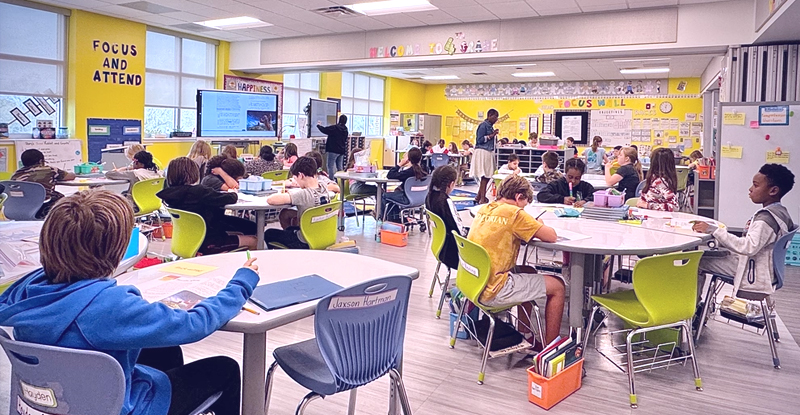By Amy Haywood
First published on Tom Klingenstein’s website with his note: Our constitutional order is being replaced by a new regime in which unelected and unaccountable bureaucrats serve as a law unto themselves. Two of the most dramatic and consequential domains where this cold civil war is being waged are our military and our schools. The two converge on DoDEA, the K-12 education system operated for the children of U.S. service members. Amy Haywood looks under the hood of DoDEA and sees all the wokeness, corruption, and incompetence that define the new regime.
—♦—
Political leaders in Castro’s Cuba were famous for parading visitors through luxury tours of Havana to boast about the successes of the communist regime. They walked visitors through state-of-the art hospitals in the city — leaving them completely ignorant of the squalid conditions of hospitals in other parts of the country, where doctors operated in tropical temperatures, medicine ran short, and patients died.
Similar stories of deception and misdirection abound about the USSR and a host of other struggling totalitarian regimes. This façade is what’s known as a Potemkin Village, designed to fool people into believing conditions are much better than they are.
Military parents might recognize this same tactic being employed at Department of Defense Education Activity (DoDEA) schools overseas.
This federal system educates more than 66,000 military children at 160 schools located in the United States and abroad. The New York Times and Brookings have hailed DoDEA as a model school system, and the National Center on Education and the Economy has called it the “relentless improver.” High National Assessment of Educational Progress (NAEP) scores and dazzling accreditation reports are trotted out as evidence of excellence.
But had these journalists and researchers consulted with military parents like me, the actual customers of DoDEA schools, a different picture would emerge — one of struggles with poor-performing teachers and administrators and of parental input being obstructed and ignored.
Failing Staff Are Shuffled Around
A mother of a DoDEA student in Korea shared with me this summer about her difficulties with DoDEA and sent me the link to a congressional hearing held by the House Armed Services Committee’s (HASC) Subcommittee on Military Personnel and Compensation on October 5, 1988.
Sydney Hickey, director of government relations for the National Military Family Association (NMFA), testified that Department of Defense dependent schools, then known as DODDS, employed many dedicated and talented teachers and administrators, but military “family members perceive that ineffective teachers and administrators are difficult, if not impossible to remove. They are instead transferred to another DODDS position. This practice is so entrenched within the closed DODDS system, it has even been given a name, ‘the dance of the lemons.’”
That was 1988. Twelve years later, in 2000, an independent evaluation of military dependent schools documented the difficulty of removing bad teachers and administrators and estimated that about two percent of teachers were failing at their jobs.
Parents were frustrated when “complaints had been made to the principal, and they could not find what, if anything, was being done to correct the situation. Military leaders and parents were dismayed when told by principals about how difficult it was to remove a poor-performing teacher.” Some “in each stakeholder group thought that the teacher unions were part of the problem, and that they defended poor-performing teachers.”
In 2007, a teacher stationed in Japan was reported for child abuse by her own three adopted children; the children were removed from the home and sent to live with foster families in the United States. The base commander revoked the teacher’s base access, but she retained her employment with DoDEA and was transferred in 2008 to a school in the Netherlands.
In 2010, she was transferred to a school in Korea, and in 2017, after undergoing reverification of background checks, she was ordered to work from home. She was finally deemed ineligible to work with children and was removed as an employee in 2018 — more than a decade after the original instance of child abuse.
That same year, a former DoDEA teacher, D.J. Wright, published Autobiography of an American Teacher, in which she wrote about the practice of “passing the trash,” another name for transferring or promoting problematic administrators.
She relayed that her school system in Japan had two cases of sexual assault in the span of two weeks. In the first incident, an 18-year-old boy who attended Kadena High School raped an intoxicated 17-year-old girl in front of other students (during school hours at on off-site location) and filmed it on his cell phone. The later sexual assault occurred on school grounds. Nevertheless, one of the school’s administrators was promoted months later. Wright wrote of other such promotions and claimed that DoDEA “has a history of promoting these types into leadership positions.”
And six years after that — summer 2024 — parents at a DoDEA Europe South school witnessed the transfer of an administrator to DoDEA Americas who had been the subject of a lawsuit and multiple inspector general (IG) investigations. A media report showed that in 2014, that same administrator had suddenly been reassigned from a school in Germany as part of a supervisory inquiry into the school’s management only days before school ended and was later transferred to another country. This administrator will now start over in yet another country, and families freshly moving into the system will be none the wiser.
And so it goes.
While there are certainly pockets of excellence within DoDEA, the inability to remove poor-performing teachers and administrators has remained part of the culture and can overshadow — to put it lightly — the entire experience of living overseas. One parent whose children attended a school in Italy told me that her family loved living abroad, but, years later, her children still struggle with abuse they experienced at their school in Aviano.
Parent Communication Is Blocked
When problems inevitably bubble to the surface in such an environment, parents are directed to take their concerns to the School Advisory Committee (SAC) or to give feedback through a stakeholder survey. This gives the illusion that parents can make a difference at their schools.
School Advisory Committees…were created to involve parents, teachers, and administrators in the education of DODDS students. To describe SACs as ‘ineffective’ is an understatement.”
—Suzanne Rucker, a parent speaking at the DOD Dependents Schools Hearing before the House Armed Services Subcommittee on Military Personnel and Compensation, 1988
Kim Day, a military spouse, began her journey with DoDEA on a three-year tour to Korea from 2012 to 2015. As was her practice stateside, she became very involved in her children’s school, serving as the SAC chair. The SAC is similar to a school board, but is only advisory in nature.
Kim quickly learned of the many problems at the school: toxic leadership, administrators who would not correct grades that had been entered incorrectly, wrongfully fired coaches that resulted in the loss of sports for kids at school, administrators who protected each other instead of children, and more.
Though she tried to provide solutions, Day says she was made to feel as if she were a troublemaker. She tried every channel available to parents to address what was happening and also served as a representative on the District Advisory Council.
She reached out to the Dependents Education Council (DEC) at headquarters in Alexandria, Virginia. She met with the school accreditation team, a regional support specialist, the school liaison officer, the Pacific West District superintendent, the DoDEA Pacific Region director, and then-director of the entire system, Tom Brady, among others.
She filed IG complaints, which circled back to DoDEA, because, in true Potemkin style, the agency investigates itself. She filed Interactive Customer Evaluation (ICE) comments, which likewise circled back to DoDEA. She wrote to Stars and Stripes, a niche DOD media outlet for military families. She wrote to Congress.
In the end, the DoDEA Pacific Region director at the time admitted there were problems and created a working group. Two school principals were removed — that is, promoted to other jobs in administration.
Day left Korea in 2015, but when her family returned in 2021, she stepped back into the exact same issues she thought had been resolved. Nothing had changed. Once she had moved away, the pressure was taken off of the system and all reverted to business as usual.
“Parents are disheartened that the same problems they faced on their first overseas tour still exists, three, five, and even ten years later.”
—Sydney Hickey, NMFA representative speaking at the DOD Dependents Schools Hearing before the House Armed Services Subcommittee on Military Personnel and Compensation, 1988
“Over the years much has been said about the need to improve parent-school communication in DODDS. Poor communication is a symptom of a greater problem — lack of accountability built into the DODDS structure. Poor communication exists because DODDS personnel know they’re not accountable to anyone outside their system.”
—Suzanne Rucker
In a proposal for Advisory Committee Reform dated March 9, 2023, Day wrote that in regard “to systemic DoDEA issues, there is no process for families to engage school leaders at Headquarters in meaningful two-way communication.” Furthermore, in the current system,
Control over advisory committees above the local level shifts from the parents, teachers, and students (high school) to the administrators. Administrators determine the council members. Administrators set the agendas. Administrators run the meetings. The school community no longer has the opportunity to determine what issues they would like raised.
From her experience as a SAC chair over two different tours, she came to the same conclusion witnesses shared with Congress in 1988 — that parents needed to be “an integral part of the system at all levels.” Thirty-six years ago, NMFA recommended that membership of the DEC needed to include elected parents. That still has not happened.
Meanwhile, military parents were experiencing similar issues at the Bahrain School. The SAC was in the process of requesting more communication from DoDEA regional leadership to parents. A dedicated parent volunteer, who has asked to remain anonymous, knew the regional superintendent would be in town and requested her attendance at the SAC meeting. The first two requests went unanswered, and the superintendent finally agreed to a meeting after the third request. In response to a question regarding a plan to improve communication between the school administration and parents, the regional superintendent allegedly said that the “only thing wrong with Bahrain School are the parents.”
“Families have tried to use the DODDS chain of command. For too many years, we’ve been told our concerns are ‘local issues.’ Today, thanks to networking, we know our concerns are shared by families around the world.”
— Suzanne Rucker
Results of FOIA
If all else failed, parents knew DoDEA would be administering a stakeholder survey to all school communities in 2023. Parents were told they would finally have a chance to speak their minds. The results of the survey were not released for months after the stated deadline, so I submitted a Freedom of Information Act (FOIA) request because I wanted to see what parents at other schools were saying. After months, I received links to the quantitative data, but the parent comments were missing. I submitted another FOIA request for the parent comments from selected DoDEA Europe South and Europe East schools in February 2024.
Seven months later, I received the results for 12 schools spanning Germany, Spain, Italy, and Bahrain. I now understand why headquarters resisted releasing the comments to the public. Aside from the comments about a child witnessing oral sex in the boys restroom at Patch Elementary School in Germany, the hookups happening in the “All Gender” restroom at Patch Middle School, the chaos of the 21st Century school classrooms, and several DEI-related concerns, most of the comments rehashed the same issues parents have been raising for decades.
But in August 2023, as headquarters continued to sit on the survey results, parents at the Bahrain School finally ditched the “chain of command” processes put in place for managing parent complaints and spoke anonymously with a reporter. Lawmakers in Washington, D.C., were now able to now read that administrators at the lower school were stonewalling parent inquiries and violating U.S. disability law. In the older grades, the school relied on long-term subs to fill vacancies and course requirements were lax. Perhaps most damning of all, formal complaints that were filed with the DoDEA IG Office had been kicked back down to the superintendent overseeing the region, which kept everything in-house.
Congress Steps In
The Subcommittee on Military Personnel visited the Bahrain School with a congressional delegation in January 2024 to meet with parents face-to-face — instead of with the gatekeepers. As a result, Subcommittee Chairman Jim Banks (R-IN) included language in the House-passed FY25 National Defense Authorization Act (NDAA) that creates a school choice pilot program in Bahrain for military kids and DOD dependents; it uses the same rules and regulations the State Department has used since 1955 to give dependents an education allowance for school choice.
Now the House bill will need to be reconciled with the Senate’s version of the bill, which has not yet been brought to the Senate floor. Parents across the world have expressed support for this pilot, as have Independent Women’s Voice, the Military Kids Special Education Alliance, and others.
Over the past three years, Congress, which has ultimate authority over military dependent schools, has stepped up its oversight after The Claremont Institute released an exposé of an official DoDEA teacher training held in 2021 where teachers in Germany and Spain admitted to “transitioning” children’s gender without the knowledge or consent of parents.
And last month, Open the Books, a government watchdog organization, released a detailed report on the same teacher training that showed the depth of DoDEA’s commitment to foisting narratives of oppressor versus oppressed, white supremacy, gender ideology, and other disturbing content on U.S. military children.
Like parents, Congress, too, has experienced DoDEA’s resistance to being held accountable. In 2021, former Rep. Vicky Hartzler (R-MO) sent a letter to Secretary of Defense Lloyd Austin asking for answers regarding the secret gender transitions of students. Secretary Austin never responded.
Rep. Elise Stefanik (R-NY) attempted to make the system more accountable to parents with her Servicemember Parents Bill of Rights, which passed into law as part of the FY24 NDAA — despite opposition from the National Education Association, the nation’s largest teachers union, which represents DoDEA educators through an affiliate called the Federal Education Association.
And Rep. Banks and Rep. Stefanik, along with 16 of their colleagues, sent a letter in July to Secretary Austin — after previous letters were ignored — again seeking answers about the indoctrination of military children and calling for an immediate change of leadership. A staffer confirmed to me that Secretary Austin did not respond by the August 16 deadline.
NAEP and Accreditation Scores
What about those high NAEP and accreditation scores?
It’s important to put to rest the myth that DoDEA leadership has anything to do with the high test scores of military kids overseas. These scores are often used to deflect criticism and to avoid accountability, which is exactly what happened when Secretary Austin faced intense questioning in a congressional hearing last year from Rep. Matt Gaetz (R-FL) about the overt racism of DoDEA’s first diversity, equity, and inclusion (DEI) chief, Kelisa Wing. Austin ended his remarks by pointing out that DoDEA schools lead the nation’s public schools in NAEP scores.
But according to a case study from the National Center on Education and Economy released this summer, three studies — two commissioned by DoD and a third commissioned by the National Education Goals Panel — concluded that “the available evidence wasn’t sufficient to explain why DoDEA’s students had performed so well on the NAEP.” Researchers were unable to determine how much credit was due to DODEA schools and how much could be “attributed to [students’] family backgrounds, their exposure to military culture, and the advantages associated with living on a military base.”
Additionally, because military children move six to nine times over the course of K-12 schooling, “many of the students who attended a DoDEA school in 4th and 8th grade (when NAEP measured their academic proficiency) likely attended regular public schools for some or all of their time in grades K–3 and 5–7, making it even harder to gauge the extent to which their scores should be attributed to their time in DoDEA schools.”
As for the accreditation scores that are routinely higher than the network average for other schools evaluated by the accreditor Cognia, the 2024 Accreditation Report for DoDEA Europe South, the school district that includes the Bahrain School, said, “It truly bears restating that the outcomes in Europe South are amazing, and the face and final product are a beautiful, intricately woven product reflected in students who are being prepared to be Citizens for the World.”
Cognia recognized DoDEA Europe South with a 2024 Schools of Distinction award as a system that “effectively implements high-quality instruction, shows consistent organizational effectiveness, and maintains a commitment to continuous improvement.” Out of 1,952 institutions, it was one of 60 to receive this designation.
The report contains no mention of an over-reliance on long-term subs or of the difficulty of removing poor-performing employees. There is no mention of the need to give parents a seat on the DEC. And nothing was mentioned about the concerning DEI issues that have lately come to light. The feedback parents had given in the 2023 Stakeholder Survey did not appear to figure into the accreditation report in any significant way.
I reviewed several other past reports for different regions, and after looking at the names and bios of the review team members, it all made sense. Though DoDEA claims that accreditation is an “objective evaluation from a team of outside peer professionals,” it was shocking to see that many DoDEA administrators and superintendents were part of the review team. Such accreditor bias is a noted criticism of the K-12 and higher education accreditation processes in the United States; in the case of DoDEA, it is merely business as usual.
Since I’ve been writing about DoDEA, I’ve learned of and communicated with parents from all over the world whose children have been negatively impacted.
As Congress continues to demand answers and provide renewed oversight to this school system that has been a law unto itself for decades, many families are holding out hope that Rep. Banks’s education allowance pilot program will soon provide overseas military families with the school choice their children need to thrive.
_
Amy Haywood is a military spouse. She served as a senior legislative assistant for a former member of the U.S. House of Representatives and was the lead staffer on the Electronic Warfare Working Group. Aside from government experience, she has worked as an early childhood educator and university adjunct professor. She holds a master’s degree in national security and strategic studies from the U.S. Naval War College.
First published on Tom Klingenstein’s website
Pentagon Secretly Institutionalized DEI In Its K-12 Public Schools
Report: U.S. Military Hides Push For Trans Surgeries, Queer Exploration Among Soldiers’ Kids








Leave a Comment